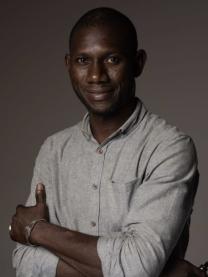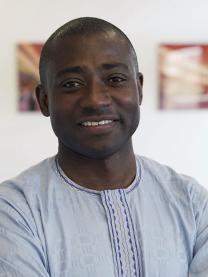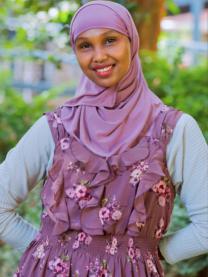The PolMig advisory board is made up of eight academic and non-academic experts on refugee and migration research, who represent different regions in Africa and expertise. They meet at least once a year to discuss the progress of the project, as well as advise on methodological or ethical questions.

Prof Mary Boatemaa Setrana
Mary is a professor and the director of the Centre for Migration Studies, at the University of Ghana. She holds a Ph.D. in Migration Studies from the University of Ghana and Radboud University, in the Netherlands. She is a member of various migration management technical and advisory groups including the African Union Commission (AUC) on migration governance, and the African Research Universities Alliance (ARUA) Centre of Excellence on Migration & Mobility. She has led several policy dialogues and stakeholder consultative meetings including the African Union’s Pan African Forum on Migration (PAFOM) and the SADC secretariat’s Migration Dialogue for Southern Africa (MIDSA). She facilitated migration and other sectoral (labour and diaspora) policymaking in Botswana, Zimbabwe, Zambia, Malawi, and Ghana. She is currently the Program Affairs and Innovative Officer for the International Association of Forced Migration Conference Committee (IASFM). Mary is a member of the consortium working on large projects including the GCRF South-South Migration, Inequality, and Development Hub.

Moctar Dan Yayé
Moctar is a human rights activist from Niger who specialises in advocating for the right of individuals on the move. He is a founding member of the Alarme Phone Sahara initiative, a project that aims to promote and defend the right of people crossing the Sahara. The project raises awareness about the situation of migrants who are utilising the Sahel-Sahara routes, documents the human rights violations along the routes and rescues people in the desert in distress. Moctar is in charge of communications and public relations since the inception of the project. He is also active in other local and regional civil society networks who fight for good governance and social justice in Africa. As an expert on the Sahel and issues of migration and (in)security in the region, Moctar has repeatedly been a valuable resource for journalists, researchers and institutions alike, offering his assessment on migration issues and the externalisation of European borders in Africa, particularly in Niger.

Sharon S. Ekambaram
Sharon is a human rights activist and has been involved in the struggle for social justice through her work. In the 1980s she worked with young people fleeing from their communities due to apartheid state repression. She was one of the founding members of the Treatment Action Campaign and before she started to work for the AIDS Consortium in the struggle for affordable treatment for people living with HIV and AIDS. Later she lead the campaign against AIDS denialism of the South African government. She then took up a position as Project Head to establish the Chris Hani Institute located at COSATU House. She worked for the international medical humanitarian organisation- Doctors Without Borders for ten years, and was the founding Director. Currently, she is the head of the Refugee and Migrant Rights Programme at Lawyers for Human Rights (LHR).

Prof Elena Fiddian-Qasmiyeh
Elena is Professor of Migration and Refugee Studies at UCL, where she is also Co-Director of the UCL-Migration Research Unit and Director of the Refuge in a Moving World network based in the UCL-Institute of Advanced Studies. Prof. Fiddian-Qasmiyeh’s research and teaching focus on the intersections between gender, generation and religion in experiences of and responses to displacement, with particular expertise vis-a-vis the Middle East and North Africa. She has conducted extensive research in refugee camps and urban areas including in Algeria, Cuba, Egypt, France, Lebanon, South Africa, Syria, Sweden, and the UK. Her books include The Ideal Refugees (2014), The Oxford Handbook of Refugee and Forced Migration Studies (2014), South-South Educational Migration, Humanitarianism and Development (2015), and The Handbook of South-South Relations (2018).

Dr Faisal Garba Muhammed
Faisal teaches Sociology at the University of Cape Town (UCT) and is the Co-Convenor of University’s Global Studies Programme. He was educated at the Universities of Ghana, Legon, Cape Town South, and has a Phd from the University of Freiburg. His areas of expertise radiate around African migration, social change, working class history and organization, African historical sociology, and social theory. He teaches courses on Social Theory, Society and Change, Globalization and Inequality and Introduction to Sociology. Faisal has conducted extensive fieldwork in Germany, Ghana, India, Nigeria, South Africa, Tanzania and the United States of America. He has contributed articles to a number of academic and popular publications on migration, culture and belonging, mobile labour and Political economy, and knowledge production and decolonisation.

Prof Francis B. Nyamnjoh
Francis is Professor of Social Anthropology at the University of Cape Town. He has taught sociology, anthropology and communication studies at universities in Cameroon and Botswana, and has researched and written extensively on Cameroon and Botswana. He served as Head of Publications at the Council for the Development of Social Science Research in Africa (CODESRIA) 2003-2009. Nyamnjoh is a B1 rated Professor and Researcher by the South African National Research Foundation (NRF); his honours include elections as Fellow of the Cameroon Academy of Science (2011), Fellow of the African Academy of Science (2014), Fellow of the Academy of Science of South Africa (2016), and International Fellow of the British Academy (2024), and distinguished awards for his publications in both creative writing and arts (2014 Eko Literature Prize) and social anthropology (ASAUK 2018 Fage & Oliver Prize for #RhodesMustFall: Nibbling at Resilient Colonialism in South Africa). His scholarly books related to the project theme include: Insiders and Outsiders: Citizenship and Xenophobia in Contemporary Southern Africa (2006); Incompleteness: Donald Trump, Populism and Citizenship (2022); Incompleteness, Mobility and Conviviality: Ad. E. Jensen Memorial Lectures 2023 Frobenius-Institut, Goethe-University (2024).

Fardosa Salah
Fardosa is a dedicated research officer specialising in refugee studies, social work, and community advocacy. She holds a double BA in Sociology and Social Work & Peace and Conflict Studies from The University of Nairobi and is an alumnus of the RSC-BIEA Fellowship and earned certification from the University of Oxford, where she focused on forced migration and social sciences research. Fardosa has extensive experience in the humanitarian sector, having worked as a Community Case Worker at HIAS Refugee Trust, where she conducted social assessments and mentored young girls and adolescent mothers and focused on Sexual Gender Based Violence prevention and response. As a Paralegal Officer at Kituo cha Sheria, she trained community groups on protection law and advocated for displaced individuals in detention. Fardosa contributed to research conducted by the Fletcher School, Tufts University, which examined the financial lives of refugees in Nairobi, Kenya. She is currently examining circular migration between Somalia and Kenya with a focus on voluntary repatriation.

Dr Kudakwashe Vanyoro
Kudakwashe is a migration and social justice researcher and academic. His work focuses on several thematic areas including ethics, policy, gender, health, governance, and humanitarianism within the African context. After completing his doctorate, in 2021, the African Centre for Migration & Society (ACMS) appointed him a Postdoctoral Research Fellow on a project called PROTECT The Right to International Protection. In 2023, he was then appointed as a Lecturer in Anthropology at the University of Witwatersrand. Kudakwashe's work typically and primarily focuses on the multifaceted aspects of migration including its socio-economic impacts, cultural integration and its limits, policy, the legal frameworks surrounding migratory movements and their implications on migrant’s lives. His research inquiries seek to push the boundaries of normative migration studies by positioning human mobility as a heuristic to reveal novel forms of governance and territorial formations. He has been appointed a 2024-25 Visiting Research Fellow at the University of Cambridge’s Centre of African Studies.